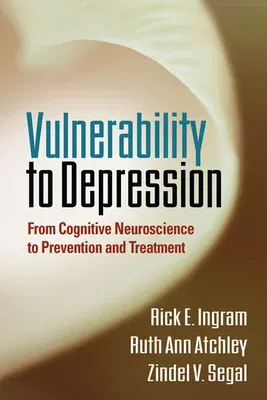Rick E Ingram
(Author)Vulnerability to Depression: From Cognitive Neuroscience to Prevention and TreatmentHardcover, 7 June 2011

Temporarily out of stock
Free Delivery
Cash on Delivery
15 Days
Free Returns
Secure Checkout

Print Length
260 pages
Language
English
Publisher
Guilford Publications
Date Published
7 Jun 2011
ISBN-10
1609182553
ISBN-13
9781609182557
Description
Product Details
Book Format:
Hardcover
Date Published:
7 June 2011
Dimensions:
22.86 x
15.24 x
2.29 cm
ISBN-10:
1609182553
ISBN-13:
9781609182557
Language:
English
Location:
New York, NY
Pages:
260
Publisher:
Weight:
521.63 gm